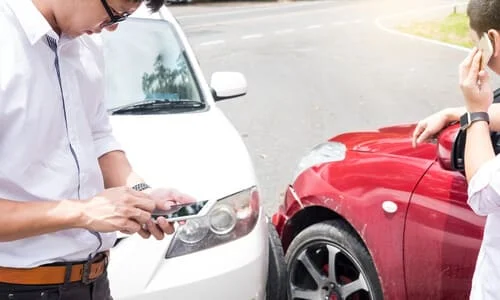 If you are an uninsured driver in California, you still have the right to sue another party if they are at fault in your car accident.
If you are an uninsured driver in California, you still have the right to sue another party if they are at fault in your car accident.
Even though car insurance is mandatory in the state, many drivers still find themselves uninsured at the time of a crash. As a result, they may be unsure of their rights to seek compensation for personal injuries and property damage.
The good news is that an uninsured driver in California can still pursue justice after an accident.
Of course, it’s going to be important to tap the help of a strong personal injury lawyer. At Singh Ahluwalia Attorneys at Law, our California personal injury lawyers are trained to help all drivers.
Our team can provide a confidential, no-obligation case review to discuss all your options — all you have to do is call (559) 878-4958 or contact us online
Can I Sue Someone for Not Having Auto Insurance?
In short, you can’t sue someone just for not having auto insurance. However, if you were involved in a car accident with another party whose negligence led to your injuries or property damage, you do have the right to sue them.
The difference between a normal case is that, instead of filing a liability claim with their insurer, you’ll have the opportunity to sue them directly.
In order to do this, you’ll need to have the other driver prove that they are liable for damages. This will generally involve a court procedure where both parties present evidence concerning their liability for the accident.
A settlement may be reached prior to the point of a trial, but if not, the case may proceed to a trial where a jury determines whether or not the accused party is liable for the expressed damages.
Be aware, though, that suing someone without insurance can be a time-consuming (and at times, costly) process.
The defendant may not have the financial resources to pay any damages awarded by the court, so a judgment may be issued as an acknowledgment of your claim that does not result in any compensation or benefits for you.
That being said, it’s still worth taking legal action if you believe that the other person was primarily responsible for causing the accident.
Your chances of recovering any damages increase if the defendant is found liable, so by consulting with a lawyer and filing suit against them you are taking an important step towards achieving justice and protecting your rights.
California’s Uninsured Motorist Laws
If you drive in California, the law requires you to have insurance for your vehicle. This law helps ensure that you injure someone else in an accident, it will be covered.
If you don’t have auto insurance and are involved in an accident, you may still be able to pursue compensation from the at-fault driver. You will likely be fined for not having the appropriate, state-mandated coverage, but this fine is different from a finding that you were at-fault.
California law recognizes two types of uninsured motorist claims: uninsured motorist bodily injury (UMBI) and uninsured motorist property damage (UMPD).
UMBI claims are used when someone is injured in an accident caused by an uninsured driver; UMPD claims are used to cover damages to your car that were caused by the uninsured driver.
The essence of these laws is to provide protection for drivers who do not have their own insurance. So, even if you don’t have auto insurance, someone could still pursue a claim through their own insurer if they accuse you as the at-fault party.
Rights to Recovery for an Uninsured Driver in California
California follows a tort-based system, which means that if you are injured in an accident caused by another, the other party may be held liable for both economic and non-economic damages.
These non-economic damages include compensation for pain and suffering, disability or disfigurement, and emotional distress. It is important to note that this type of coverage is only available if the other party was at fault for the accident.
In California, an uninsured driver still has the right to seek justice after an accident. You can file a civil lawsuit against the other driver in order to try and recover compensation for any medical expenses incurred, lost wages, and/or pain and suffering.
The primary way to do this is by filing a personal injury claim against the other driver through their insurance (if applicable). The claim would need to allege that the other party was negligent and that their negligence was the cause of the accident and your injuries.
In order to prove negligence, you would need to show that the other party owed you a duty of care, that they breached that duty by acting negligently or recklessly, and that their breach caused your injuries.
Is California a Fault Based State?
Yes, California is a fault based state, and because of this every driver — including an uninsured driver — has the right to hold a negligent party responsible for any accident, damages or injury they’ve caused.
Essentially, a fault-based state is a legal term used to describe a state’s system for determining liability in a car accident. In a fault-based state, the driver who is found to be at fault for causing a car accident is responsible for paying for the resulting damages.
In order to determine fault in a car accident, California law requires that the party alleging fault (the plaintiff) prove that the other party (the defendant) was negligent.
Negligence is a legal concept that means the defendant failed to exercise reasonable care and caution while driving, and as a result, caused the accident and the plaintiff’s injuries.
To establish negligence, the plaintiff must show that the defendant had a duty to exercise reasonable care while driving, that the defendant breached that duty by failing to act reasonably, and that the breach caused the plaintiff’s injuries.
If the plaintiff can prove all of these elements, the defendant can be held liable for the resulting damages, which may include medical expenses, lost wages, and property damage.
What Is Comparative Fault?
Comparative fault is a legal doctrine which allows an injured party, who is partially at fault for an accident, to seek compensation (even if they are not completely blameless).
Under the doctrine of comparative fault, the court will assess how much of the fault belongs to each party involved in the accident.
If it is determined that the uninsured driver was partly at fault, they may still be able to recover damages, though their award will likely be reduced according to their degree of culpability.
For example, if an uninsured driver was making an improper lane change at the time of an accident and was hit by a car going through a stop sign, 50% of the fault may be attributed to each of them and their award could be reduced by half.
The court will also look at other factors, such as speed, whether there was any negligence, and whether either party failed to exercise reasonable care before deciding who bears how much responsibility for the accident.
What Does Pure Comparative Negligence Mean?
In California, the courts use a system of pure comparative negligence to determine the fault and level of financial responsibility after an accident.
This means that if you were uninsured at the time of the accident, it will have no impact on your ability to file a personal injury lawsuit — though your recoverable damages may be reduced depending on how much you were deemed to be at fault for the crash.
As an example, if you were deemed to be 40% responsible for a crash but another driver was deemed 60% at fault for the crash, a court could order that other driver to pay 60% of damages awarded in your case.
The court would also order you to pay 40% of those same damages, but since you don’t have auto insurance in California, that 40% would be your own duty to cover.
Still, it’s important for all uninsured drivers who’ve been involved in an accident to understand their right to pursue compensation and seek a Fresno car accident attorney as legal counsel as soon as possible.
Doing so can help minimize any potential reductions in damages due to comparative negligence while ensuring that they receive as much financial coverage as possible.
Work With a Car Accident Attorney Who Can Protect You Rights
Not having insurance is a violation of California law, but it is different from the separate matter of fault in a car accident. While you may face a fine for not having insurance, it is critical to still report the accident, preferably by calling 911 and having a police respondent come to the scene.
You can still pursue an injury claim against any at-fault parties, regardless of whether you had your own insurance, if you can prove that they are responsible for your damages.
So if you want to find out how much your course may be worth, and whether you have the right to pursue legal action, contact Singh Ahluwalia Attorneys at Law today.
Our team can provide a confidential, no-obligation case review to discuss all your options — all you have to do is call (559) 878-4958 or contact us online.


